  |
| HOME | THIS ISSUE | CALENDAR | GRANTS | BACK ISSUES | < BACK | NEXT > |
Class of '07 Outstanding Graduating Studentsby Kristina Goodnough - May 14, 2007 | ||||
Devika Dhandapaniby Sherry FisherDevika Dhandapani, a physiology and neurobiology major in UConn’s Combined Program in Medicine, says community outreach has been a significant part of her college career.
“It has been very exciting,” says Dhandapani, who has planned and coordinated trips for UConn students in places such as New Orleans, Philadelphia, and Biloxi, Miss. A Nutmeg Scholar, Dhandapani was valedictorian at Mark T. Sheehan High School in Wallingford. She says her “most exciting feat right now” is leading UConn’s first international service learning trip to the Dominican Republic. The group will spend 20 days there, teaching nutrition and sex education to people in various villages. They will also teach English in a Haitian school. Dhandapani, who has been active in the Honors Program, has mentored many students within the program. “I try to get them to realize the potential of the college experience as long as they take it into their own hands and seek out opportunities,” she says. “I realized when I was a freshman that I needed that.” She says her experience spending a semester through the Study Abroad program at the National University of Singapore last fall was a “grand finale for my time at UConn, and put a lot of things into perspective.” Dhandapani received a Student Life Award for Individual Community Service; an Outstanding Senior Woman Award from the College of Liberal Arts and Sciences; and a citation for academic excellence from the Connecticut state legislature. “UConn has afforded me so many opportunities,” Dhandapani says, “especially through the Honors Program. I’ve gotten a diverse and rich education here.” She will attend UConn’s School of Medicine in the fall.
Carleen Grahamby Karen McCormick, ’07“I think UConn can offer a lot of different people what they want,” says Carleen Graham, an international relations major.
“I wanted a large university where I would have lots of different opportunities,” she says. She found UConn offers lots of activities, as well as requiring academic rigor. In her spare time, Graham has been involved with UConn PIRG (Public Interest Research Group). She also worked for the Writing Center, and was a writing liaison for the individualized major department, helping fellow students with their writing. “Writing my thesis was an eye-opening experience,” she says. Graham’s thesis was a study of the “resource curse” effect, that looked at major oil exporting countries. “The resource curse effect is a developmental phenomenon where developing nations that have abundant natural resources tend to under-perform economically,” she says. “I’m interested in major oil exporters, because oil is such a lucrative natural resource.” Graham, who graduated with a 3.95 GPA, will enroll in Emory University’s political science Ph.D. program, with a focus in international relations and international political economy. After obtaining her doctorate she plans on a career in academia.
Bethany Lepineby Sherry FisherBethany Lepine, a biomedical engineering major, has spent much of her time involved in community outreach. She started volunteering with a homeless shelter in Willimantic called the No Freeze Hospitality Clinic in January 2006.
“For the past year, I’ve been organizing close to 60 volunteers,” she says. “We’ve been doing fundraisers and awareness events, and were able to help train people to be site leaders.” Lepine received a Student Life Award for her efforts. Her interest in helping others led to a 10-day trip to Haiti for an independent study on healthcare technology in underdeveloped countries. “We saw different programs in action and learned what programs the U.S. is implementing to affect change,” she says. For the past two spring breaks, she has gone to Kentucky to help rebuild homes for the poor. “I chose biomedical engineering because I want to use the skills I have to do something productive,” she says. “That’s one of the big things that I get out of these trips. Part of the reason I’m doing the independent study on Haiti is that I’m learning to use my skills to benefit society.” Lepine, who spent a portion of her college career on the cross country and track and field team, worked on a senior project with the UConn Health Center, designing a tool to test the properties of orthodontic wires. “In engineering, something you design can impact thousands of people if it goes to market,” she says. “Even if you make a small change, it can make a procedure less painful.” Lepine, who will be working as a mechanical engineer at Dominion Nuclear Connecticut, says that while UConn is a large university full of opportunities, “it feels like home.”
Aaron Mushengyeziby Cindy WeissAaron Mushengyezi, a Ph.D. graduate in English, will return to his native Uganda after graduation with a trove of stories that preserve the country’s tradition of passing folk tales from elders to children. Mushengyezi came to UConn in 2002 on a Ford Foundation fellowship after earning his master’s degree in African literature in Uganda.
Twice he returned to the countryside of Uganda, recording more than 500 children’s songs and stories passed along by village performers and elders such as Isaya Katuka. Katuka is about 88 years old, and he is a “reference point” for many of the country’s traditions, says Mushengyezi. “If you lose a guy like that – everything is gone,” he says. To prevent that, Mushengyezi transcribed the children’s tales he collected into English and three dialects – from Luganda, in central Uganda; and from Runyankore and Rufumbira-Runyarwanda in the southwest. He hopes to publish the stories in bilingual books for children that could be used in Uganda’s bilingual education system. “Aaron’s work is a product of a national agenda – shaped by an urge to preserve Ugandan culture,” says Higgonet. Mushengyezi grew up in rural Uganda, where his mother, now 78, told him the folk tales. Traditionally, children hear them from their elders after the evening meal. “Collecting the stories gave me a kind of nostalgic feeling,” he says. Today’s rural children often are sent to boarding school, or they are read to rather than told the stories. Urban children never experienced the oral tradition. Mushengyezi’s own children – three boys, ages 8, 6, and 3 – live in Kampala with his wife. He will return there and take a job as a senior lecturer in the literature department at Makerere University. Joshua Fairchildby Karen McCormick, ’07Joshua Fairchild, a psychology major, started college as an English major.
“I got hooked,” he says. “Professor Miller is so interesting and so dynamic, he kept me engaged Tuesdays and Thursdays at 8 a.m.” As a result of taking that class, Fairchild decided to major in psychology and minor in neuroscience. “It’s something I never thought I’d touch, but I’ve been loving it,” he says. After taking the class, he was selected by Miller to be a supplemental instruction leader, holding study sessions for students who wished to attend. Fairchild also worked in the lab of Etan Markus, associate professor of psychology. For his honors thesis, he studied visual startle responses in rats. Last summer, Fairchild interned at Fellowship Place in New Haven, a social and vocational rehabilitation center for people with psychiatric and drug abuse problems. While there, he ran stress and anger management groups and taught art therapy. Upon leaving, Fairchild was surprised to receive gifts and a standing ovation from the patients. “It seems I was able to make a connection with people,” he says. Fairchild has also worked at the University’s Center for Students with Disabilities, and has served as social chair of the psychology honor society. He was also a member of the Agents of Improv and Dramatic Paws, giving him the chance to let loose. “It was nice to get out there, to be silly and laugh,” he says. Fairchild made the most of his time at UConn through teaching experiences, hands-on research, and an internship. “I’m ready to see what’s out there in the rest of the world but I’m not ready to leave,” he says. “I love it here.” Currently he is applying for clinical research positions. He plans to apply to doctoral programs in the future. Fairchild is one of the students interviewed by Miller about his experiences at UConn in a podcast recorded during the psychology department’s undergraduate Commencement reception. Listen to the podcast.
Tristan Jonesby Cindy WeissTristan Jones, is an actuarial science major with some impressive statistics of his own to analyze.
Tristan was one of two seniors, along with women’s soccer player Courtney Sands, ’07, to receive the Donald Kinsman Award, the highest award from the Counseling Program for Intercollegiate Athletes at UConn. It recognizes academic and athletic achievement, leadership, service, perseverance, and character. He was UConn’s Big East Scholar-Athlete of the Year and co-captain of the swimming and diving team. He holds UConn records in the 100-yard breaststroke and 200-yard individual medley, and was one of four UConn student-athletes nominated last year to the NCAA Leadership Conference. He swims all strokes and all events, something that in itself is unusual, according to Goldberg. He has times that are in the top 10 at UConn in seven different individual events, is on all five UConn team relay records, and is an All Big East Conference Swimmer. Out of the pool, he has impressive stats, too. Tristan is a Babbidge Scholar, recognizing his three perfect 4.0 semesters. He was awarded the Gordon Aston Actuarial Scholarship. He has passed three professional exams of the Society of Actuaries. UConn’s Actuarial Science Program in the mathematics department is known for the professional preparation of its students, who are in high demand in the financial services industry. Tristan has accepted a job with CIGNA in Philadelphia, one of two places — along with ING — where he interned. Last year his father died, and Tristan returned home to Wanniassa, Australia, for several weeks. He still finished the year with high marks, maintaining his momentum, as his coach says, toward the standards of excellence he has always worked for. Last week, his mother and grandparents traveled halfway around the world to Storrs to see him graduate.
Sudha Ballaby Nan CooperSudha Balla, a doctoral candidate in the Department of Computer Science & Engineering, has won a prestigious Sallie Rosen Kaplan (SRK) Fellowship for Women Scientists in Cancer Research, awarded by the National Cancer Institute of the National Institutes of Health.
She graduated with her Ph.D. from the School of Engineering May 5, and will begin her Fellowship during the summer. “I hope to work on a project that requires new computational approaches to address very important challenges that exist today in the domain of cancer research,” she says. The SRK Fellowship is competitive, and recipients are selected by a committee. The award enables Fellows to train in any of the National Cancer Institute’s research facilities in Maryland, to examine basic, clinical, epidemiological, or prevention science. Each SRK Fellow is supported by an intramural Cancer Research Training Award. The duration of the Fellowship is typically two to five years. Balla earned her master’s degree at the University of Bridgeport in 2002, and began her doctoral studies at UConn in the area of algorithmic applications to bioinformatics. Her doctoral work centered on development of novel computational techniques for problems in molecular biology that involve identification of complex signals called motifs appearing in large datasets. These motifs, she says, “have applications in the discovery of biologically significant regions in our DNA, understanding gene function, and efficiently designing drugs for disease.” Balla, whose adviser was Sanguthevar Rajasekaran, the UTC Professor of Computer Science & Engineering and director of the Booth Engineering Center for Advanced Technology, collaborated on an inter-disciplinary team involving faculty and students from the departments of Computer Science & Engineering in Storrs and Neuroscience and Molecular, Microbial, & Structural Biology at the Health Center. The team developed an online application, Minimotif Miner, used by biological researchers to investigate protein function and derive novel hypotheses for the causes of human diseases.
Veronica Segarraby Karen McCormick, ’07“Since elementary school my mom has been telling me: ‘You’re going to college,’ says Veronica Segarra, a graduate student earning a master’s degree in communication disorders.
“My mom is a single mom, she needed the help,” she says. Growing up with an older brother with cerebral palsy and mental retardation, Segarra became interested in how he was treated. During her senior year of high school, Segarra was a teacher’s aide for a reading and writing enrichment program. She also participated in research that was published in the Journal of Communication Disorders. While attending UConn, Segarra worked for Birth to 3, an early intervention program for children with developmental disabilities. She was a graduate assistant on an NIH-funded three-year research project with the School of Nursing that uses an interactive software education program to teach older adults about medication literacy, safety, and adherence. “The goal of the project is to help enhance self-efficacy among older adults to be able to use medications in a safe and effective manner,” says Segarra. Outside of speech pathology, she has worked as a community assistant for the past five years for the Department of Residential Life. Segarra’s busy schedule taught her how to balance her priorities. “No matter what,” she says, “you need to give yourself a break to have a social life.” After graduation, Segarra, who is bilingual, plans to do speech pathology in schools that have a large number of Spanish-speaking students. |
| ADVANCE HOME UCONN HOME |

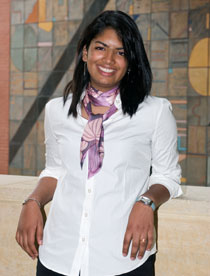 She is the first coordinator of the Alternative Breaks and Immersion Program for Community Outreach, which organizes service learning experiences designed to heighten students’ awareness of critical social issues and enhance their individual growth.
She is the first coordinator of the Alternative Breaks and Immersion Program for Community Outreach, which organizes service learning experiences designed to heighten students’ awareness of critical social issues and enhance their individual growth. 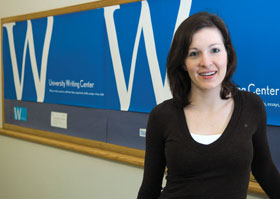 Graham, who attended Simsbury High School, transferred from a smaller liberal arts school to UConn after her freshman year.
Graham, who attended Simsbury High School, transferred from a smaller liberal arts school to UConn after her freshman year. 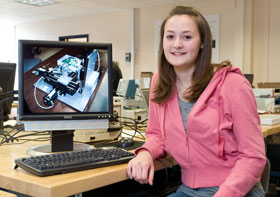 She became program director there, and then was asked to direct another shelter in Rockville.
She became program director there, and then was asked to direct another shelter in Rockville. 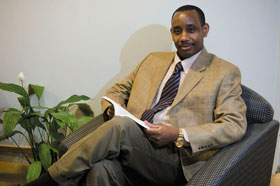 Working with faculty adviser Margaret Higonnet, a professor of English, he devoted his doctoral dissertation to documenting and analyzing Ugandan folk tales for children.
Working with faculty adviser Margaret Higonnet, a professor of English, he devoted his doctoral dissertation to documenting and analyzing Ugandan folk tales for children.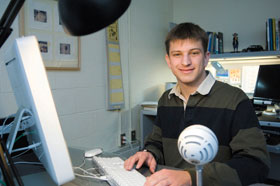 But his plans changed after enrolling in Professor David Miller’s Psychology 132 class.
But his plans changed after enrolling in Professor David Miller’s Psychology 132 class.  An outstanding scholar, with a cumulative GPA of 3.94, he is also an outstanding athlete and, as head swim coach Bob Goldberg says, an outstanding person.
An outstanding scholar, with a cumulative GPA of 3.94, he is also an outstanding athlete and, as head swim coach Bob Goldberg says, an outstanding person.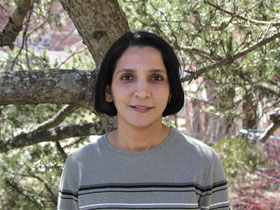 Balla is one of only seven researchers nationwide to receive the 2007 award, which is open to female researchers nationwide who earned a doctoral degree within the past five years.
Balla is one of only seven researchers nationwide to receive the 2007 award, which is open to female researchers nationwide who earned a doctoral degree within the past five years. 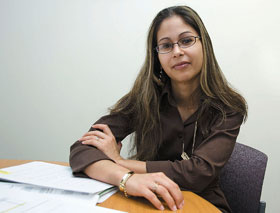 Segarra came to UConn as an undergraduate from Crosby High School in Waterbury, after she was offered a scholarship that paid for her full tuition.
Segarra came to UConn as an undergraduate from Crosby High School in Waterbury, after she was offered a scholarship that paid for her full tuition.